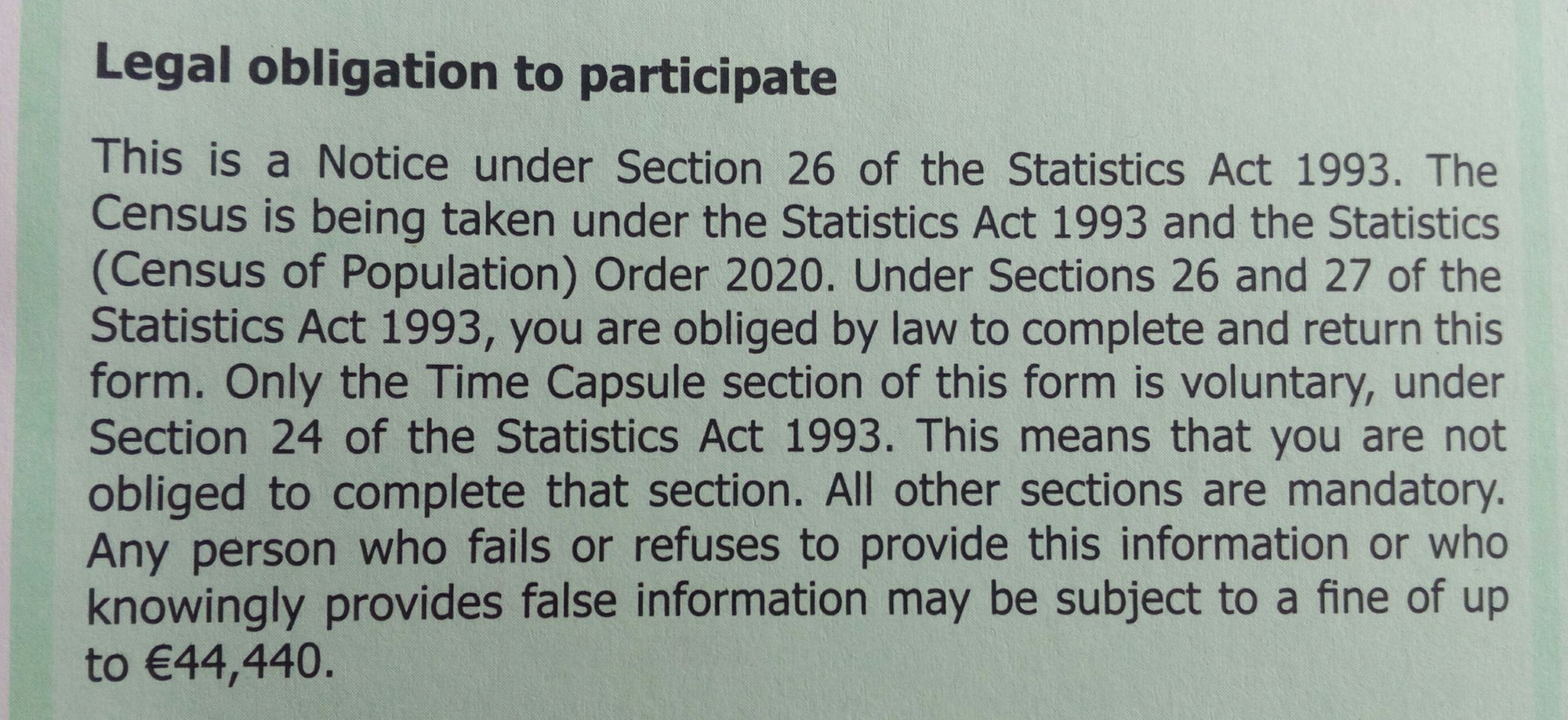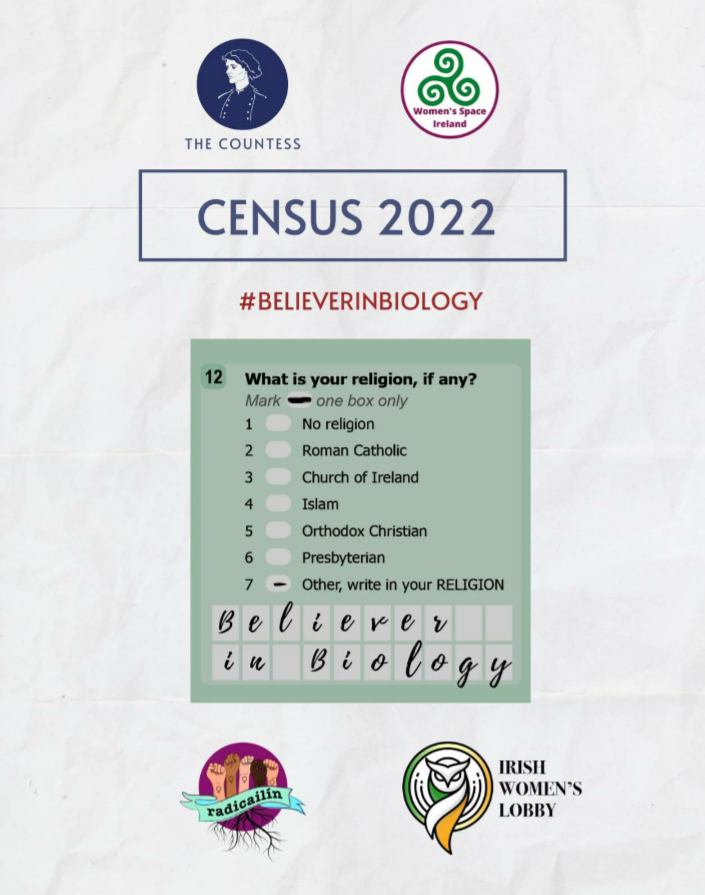Sex should matter in Census 2022
Why have gender identity lobbyists been influencing the Central Statistics Office regarding Census 2022? Those who say they feel "uncomfortable" at acknowledging their sex have been allowed tick both boxes and where the response is not clearly indicated, a sex "will be assigned at random."

Just over a hundred years ago Irish women protested at not having the vote when the 1911 census was taken.
"The enumerator who collected the 1911 census return for 27 Dartmouth Square in Ranelagh was probably not too amused by the details provided. Susan Manning had determined to use the census to make a statement about the denial of female suffrage, recording her religion as 'militant suffragette' and her disability as 'legally unfit to vote'."
Today is Census 2022 postponed due to the Covid-19 pandemic. It's the first time government will be collecting vital national statistics to help plan public policies since the last one in 2016. On this occasion Irish women will also be protesting, but this time over the relentless lobbying to try to replace the reality of sex with the concept of "gender identity" in legislation and society.
EU legislation requires the State to collect the numbers of each sex, one of the most important variables to be collated and used in analyses e.g. of crime statistics, both perpetrators and victims. It's therefore of great significance when trying to understand how policies affect equality between the sexes for instance.
In advice on answering census questions on its website, the CSO said that almost all the information in a census is analysed by age and sex.
Already we have men in Limerick women's prison being counted as if they were female simply because they are in a women's prison, thanks to the 2015 Gender Recognition Act which affords those with a Gender Recognition Certificate legal recognition as the opposite sex. By inaccurately recording men as women the statistics for the numbers of women in our jails - and the crimes they are said to have committed - our national statistics are already being distorted. According to the Gardai
"A person will be recorded on PULSE under the name presented on the Certificate of conviction or if applicable the name on the Gender Recognition certificate."
In preparation for this census a Census Advisory Group was set up. Last year The Journal reported that the Central Statistics Office (CSO) had confirmed that Census 2022 wouldn't include a question about citizens’ gender identity, "but research is being carried out into including the question in subsequent ones".
"After a recommendation was made that the 2016 question should be kept while further information and research is done, the CSO said that it informed stakeholders and interest groups about what would be included in Census 2022.
These included BeLonGTo, TENI and the Hate and Hostility Research Group."
Last year the CSO carried out two Pulse surveys which included questions about gender identity. The background notes to the May-June Pulse survey of 10,454 people say that
"Respondents were asked whether the the gender they identify with is the same as their sex registered at birth? If they answer 'No' they were asked to describe their gender identity."
The CSO have since said
"The number of people who responded to our gender identity question was less than 1% in both Pulse 1 and Pulse 2."
However it looks as if that was not good enough for the lobby groups. Under the Statistics Act 1993, section 43

and the census form itself makes it clear on the front page that anyone "who knowingly provides false information may be subject to a fine of up to €44,440."

The CSO in its online guidance says that
"If you are uncomfortable ticking one of these options you may signal this by marking both boxes."
"However, for statistical analysis purposes all entries will be assigned a sex, where this is not clearly indicated on a Census form it will be assigned at random."

Asked if the CSO could indicate other examples of questions in the Census where if an answer is not clearly indicated on a Census form it is assigned at random by the CSO, the reply was
"No values are assigned at random on the census file. For the sex question, where a response other than male or female or a missing response is recorded for a person on a census form, CSO will impute a value of male or female reflecting the distribution of sex across the population, which is approximately 50/50."
According to a report in The Irish Times on the position of the CSO:
"...the random allocation of sex to those who chose not to declare themselves as male or female would not have a statistical impact."
Further evidence that the lobbying of the CSO by activist groups must have been considerable is clear in the fact that "gender identity and sexual orientation" was unique among all topics in earning an appendix to the "Report on the public consultation on content of Census 2021 and the Census Pilot Survey 2018":

Believer In Biology
In response to this attempt by lobbyists to replace the reality of sex with the undefinable concept of "gender identity" in law and society, Irish women have also mobilised in the two weeks up to April 3rd's Census Night. We're asking people to protest at this attempt to disrupt the collection of necessary and accurate data related to one's sex by signifying themselves to be a Believer In Biology for question 12, the religion question. This was a particularly appropriate question to add our belief to, since a belief in a "gender identity" is just that - only a belief for which there is no proof, unlike one's sex.

Unfortunately this attempt to replace sex with gender identity isn't just happening in Ireland. In Scotland Fair Play for Women lost their challenge in the Scottish Appeal Court over the meaning of “sex” for the Scottish census which opened on February 28th.
"The data collected for “sex” will now be based on self-ID. Some male people will be counted as female. Scotland will no longer collect clear and reliable data on sex for women and girls. Equality monitoring, and the ability of public bodies to fulfil their obligations to uphold fairness for all, will be seriously impeded. The data will be lost, never to be regained or disentangled later."
"The English High Court ordered similar guidance produced by the Office for National Statistics (ONS) to be taken down just days before Census Day for England and Wales in March 2021."
The little-known about Yogyakarta Principles, including the later version known as the YP+10, despite not being binding on the Irish State are clearly influencing governments worldwide:

As Dr Nicola Williams, director of Fair Play for Women has pointed out
"The idea that sex isn’t just a matter of being born female or male, and that we all have a gender identity, has become embedded within organisations. As a result, sex is being overridden by gender identity in a whole range of public policies without proper scrutiny. It’s women and girls who pay the price.'”


